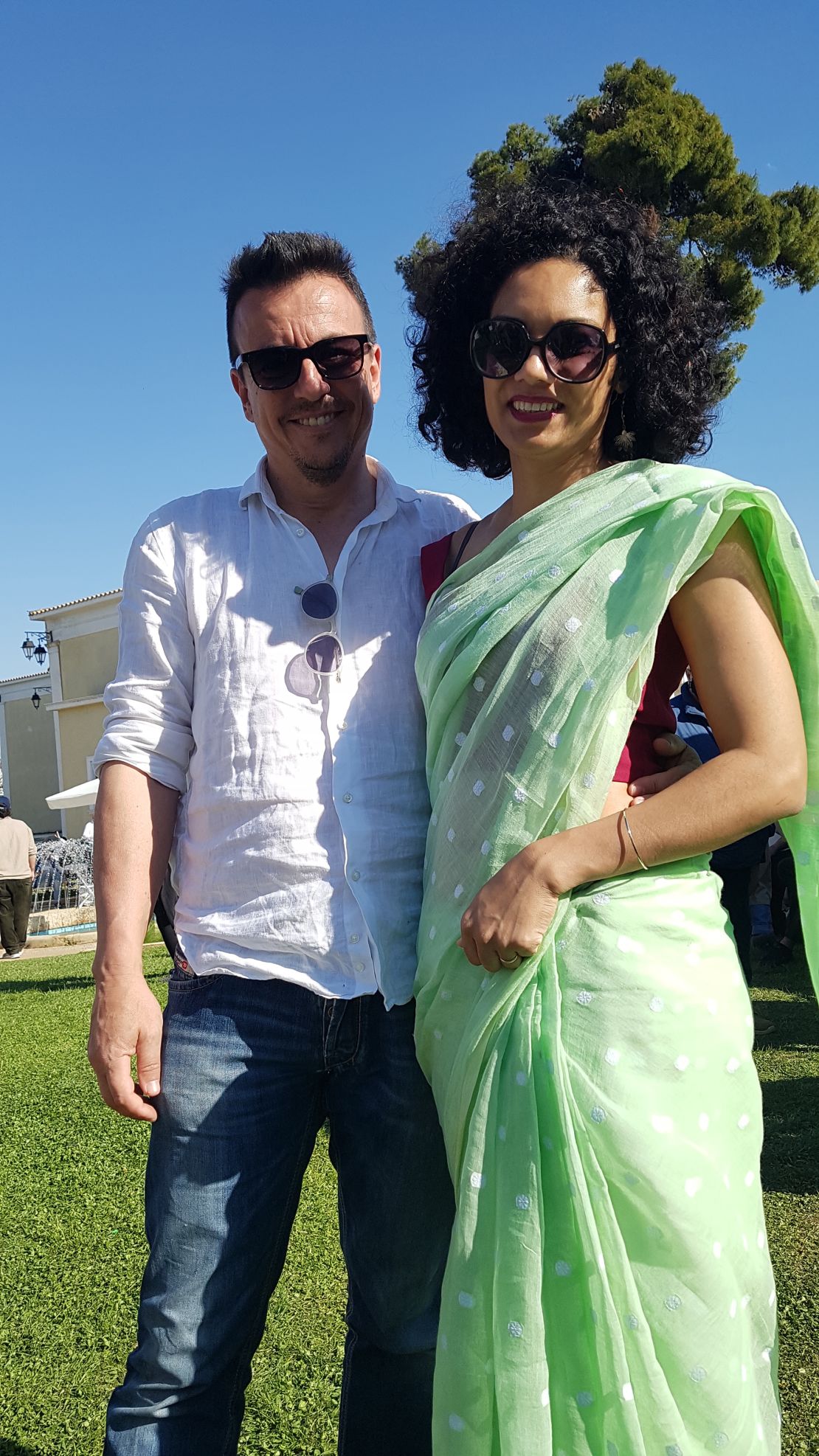Omaira Gill grew up counting down the days to each Olympic Games.
“It was a big deal in our house,” Omaira tells CNN Travel today. “I remember watching with my parents and I used to always think, ‘I’m going to go one day. I’d love to go to the Olympics.’”
Omaira wasn’t especially sporty, so she ruled out the prospect of competing pretty early on. But she still harbored Olympic dreams – even just spectating would do.
In 2004, the year Omaira turned 22, the Olympics were set to return to their birthplace of Athens, Greece.
Omaira grew up near Birmingham, in the United Kingdom. Athens was a little less than four hours away by airplane.
“I thought, ‘Okay, Athens, that’s the closest it’s ever come to me in my lifetime,’” recalls Omaira. “I didn’t know then that eventually the Olympics would come to London as well. So I thought, ‘Let me see if I can go to the Athens Olympics. I’ll see if there’s tickets for gymnastics or something like that. Maybe I could go to the opening ceremony…’”
Several months before the start of the games, Omaira was finishing up her journalism degree and staying at her parents’ home for the holidays. Noodling around on the family computer, Omaira spent hours researching the logistics of attending the games.
Eventually, she found herself on the official Athens 2004 website.
“In the corner of the site there was this little banner saying, ‘Volunteers,’” recalls Omaira. “And I thought, ‘Well, that’s even better. Because that puts you inside the Olympics. And you get the full experience of the Olympic Games. That would be amazing.’”
Omaira signed up right away, registering interest in the media village – the obvious choice for a journalism student.
“And then a couple of months passed. Uni finished. This, that and the other happened…And I still heard nothing back from my application.”
Summer rolled around. The opening ceremony was imminent. There was still nothing in Omaira’s inbox from the Athens volunteer team. She was starting to think her Olympic dream wasn’t meant to be.
“And then out of the blue one morning, I got a phone call saying, ‘Are you still interested in volunteering at the Olympics?’”
The speaker barely finished their sentence before Omaira confirmed that yes, she was definitely still interested.
“Would you mind if it’s the shooting center and not the media village, like you requested?” asked the voice on the other end.
Omaira didn’t even hesitate.
“I don’t care,” she said. “I’d just love to be there.”
The unknown speaker told Omaira the job was hers – as long as she could make the necessary travel arrangements, and find somewhere to stay for the duration of the Games.
“I think he also gave me a really basic rough outline of where I would need to be for initial training, and where to pick up my uniform,” says Omaira. “Then I hung up and started screaming. My dad was like, ‘What’s happened? What’s the matter with you?’”
As luck would have it, Omaira had a friend from college who lived in Athens, who offered her a room for the duration of the Games. Within days, Omaira was on a flight to Greece.
An unexpected opportunity

From the moment Omaira landed in Athens, everything was a whirlwind. She was invited to watch the final dress rehearsal of the opening ceremony. Omaira teared up as she watched the opening countdown, in giddy disbelief that she’d finally made it to the Games.
And then Omaira was off to work at the shooting center, where the Games’ shooting events were held.
“My very first day at work – well, first day of training, let’s say – I was late,” she recalls. “The shooting center was way out in the sticks, around the area where the airport is. I took the train, and later worked out that the bus was actually a lot faster.”
Omaira, along with a few other latecomers, eventually arrived that first day embarrassed and flustered. Omaira tried to apologize, but her words were batted away by the guy heading up the shooting center.
“These things happen,” he said.
Instead of berating them for tardiness, the shooting center manager suggested the volunteers reconvene that evening in the city center, for a city tour and a few drinks.
“So then we turn up at Syntagma Square (Athens’ main public square) that evening. And we were all kind of more fresh, more relaxed,”? recalls Omaira.
The shooting center manager arrived last. He smiled and waved as he approached the rest of the group.
“And that’s what I noticed,” recalls Omaira. “I was like, ‘Oh, he’s quite good-looking. He’s quite cute.’”
She also learned his name: Dimitris Athanasiou. Early thirties. Born and raised in Athens. Warm, friendly, welcoming. Omaira liked him right away.
“But I didn’t make anything of it,” says Omaira. “Because I thought, ‘Okay, you’re young, free and single. It’s great. It’s summertime. Just enjoy your time here.’”
Later that evening, Omaira found herself seated at one end of a long table filled with excited Olympics volunteers. Dimitris was at the other end.
“He kind of waved, saying, ‘Come sit over here,’” recalls Omaira. “And I would have never done that normally, but I got up and sat next to him.”
Right away, Omaira found Dimitris easy and fun company.
“I just remember thinking, ‘Wow, he’s really interesting to talk to,’” she says. “I was quite a sheltered person growing up. I was raised Muslim, my family is modern, but they’re still quite conservative about things like dating and stuff like that. So I didn’t really talk so much to guys. But I found Dimitris really interesting to have conversations with.”
Over the course of the Athens Olympics, Omaira worked in spectator services at the shooting center, checking tickets, pointing Olympic visitors toward the bathrooms. She loved soaking up their excitement and enjoyed the insight into the Olympics’ behind the scenes. But she also spent a lot of time thinking about Dimitris.
“I would live for those two minutes when he would come and change my shift,” she recalls. “I’d be like, ‘What time is it? What time is it? Have three hours passed yet? When is he coming?’” And then I’d see him walking towards me and I’d be like, ‘Act normal, try and act normal.’”
Omaira and Dimitris always exchanged a few friendly words. But the conversations were brief. Dimitris was busy heading up the volunteers, and Omaira was busy working.
“We spent no time together, really,” Omaira says. “I don’t know why we clicked.”
Meeting Dimitris
As Omaira got to know Dimitris, she learned he didn’t grow up with the same reverence for the Olympics as she had. He told her he saw the Games more as a “good job opportunity” than anything else.
But Dimitris was happy to see Athens abuzz with activity. And he enjoyed sharing his city with the shooting center volunteers – he took the group out most nights, guiding them around his favorite Athenian spots.
“It was exciting knowing that the games were in Athens,” Dimitris tells CNN Travel today. “The public was a little split about the cost of hosting the Games, and as we know, they eventually were a big factor in how much debt the country got into. But at the time they kicked off, people were excited. It felt like a chance to present modern Greece to the world.”
Dimitris’ official job title was Markopoulo Olympic Shooting Centre venue manager. Early on, he realized shooting hadn’t attracted the same numbers of volunteers as some of the other Olympic sports. In a quest to increase headcount, Dimitris ended up going through the other centers’ applications. He discovered Omaira’s application right at the end of this process. It was Dimitris who’d called her that day earlier in summer 2004, to ask if she was still interested in volunteering. Omaira was the last person he recruited.
Once he’d gathered his shooting center group together, Dimtiris was determined “to make sure they had fun.” Sure, they needed to work hard – but this was also a once-in-a-lifetime experience, and Dimitris encouraged the volunteers to make the most of it.
That’s why he was lenient when Omaira and some of the others were late that first day – and why he suggested going out later that evening.
He enjoyed getting to know all the volunteers – who hailed from across the world and ranged in age. Everyone seemed fun and friendly. But Omaira stood out.
“I do remember walking up to the fountain in Syntagma Square, where they were all waiting that first night and thinking she was cute,” Dimitris recalls.
Dimitris liked speaking with Omaira that first evening. And he enjoyed their brief workday interactions, and looked forward to their friendly chats on nights out. But while Omaira was cultivating a pretty heady crush, Dimitris didn’t really have time to engage with his potential feelings.
“I thought she was pretty,” he says. “But I was so busy I didn’t really have time to pay much attention.”
Working the Olympics was “busy and exciting,” Dimitris recalls, unlike anything he’d done before. And as well as working constantly, Dimitris was also hosting several of the volunteers at his apartment. Plus, the shooting center gang were regularly going out until the early hours of the morning.
On the final night, the group went out together for the last time. As they weaved in and out of bars, walking through the cobbled Athens streets, Omaira and Dimitris ended up side by side.
They were chatting, flirting. Omaira talked about how much she liked Greece, Dimitris quizzed her on whether she enjoyed camping, and asked about her thoughts on dogs.
“Okay,” he concluded. “Will you marry me then?”
“Yeah, okay,” said Omaira, laughing.
She’d bought a “tacky, souvenir ring” during her time in Athens. Now, Omaira pulled it off her finger and handed it to Dimitris.
“If you’re going to propose to me, you have to do it properly, with the ring,” she said.
“Okay, will you marry me, with this ring?” he said, laughing and holding out the ring.
“Sure,” said Omaira. And Dimitris slipped the ring onto her wedding finger.
It was just a light-hearted conversation. But to Omaira, the words felt charged.
“That evening, as we were parting ways, I kept thinking, ‘I should say something to him. I really like this guy. I should say something because I’m leaving the next day and I have literally nothing to lose right now. If he says no, I’m never going to see him again…’” she recalls.
But Omaira couldn’t bring herself to speak her feelings aloud.
“So I didn’t say anything. And I returned back to the UK.”
As for Dimitris, he was moving straight from working the Olympic Games to working the Paralympic Games. He didn’t really have time to fully register how he felt about Omaira leaving.
But as they said their goodbyes, Dimitris found himself thinking about the previous night’s marriage conversation.
“I remember looking at her and thinking ‘I could really marry her,’” he says. “I’d never felt that before.”
Staying in touch
When Omaira landed back in the UK, her mother picked her up at the airport. Omaira got into the car passenger seat and her mother looked at her, narrowing her eyes.
“You’ve met someone,” she said.
“No, don’t be ridiculous,” said Omaira.
Her mother just raised her eyebrows in response.
“She clocked on straight away,” says Omaira today. “She knew.”
A couple days later, Omaira caved, and confided in her mother about Dimitris.
“You’re right,” she said. “I did meet someone. I want to go back to Athens, I have to find out how he feels about me.”
Omaira’s mother was sympathetic, but practical.
“You can’t do that,” she said. “You don’t know this person.”
So instead of jumping on another flight, Omaira resorted to keeping in touch with Dimitiris over MSN Messenger. Social media was in its infancy back in 2004, but instant messaging had taken off. It was an easy way of communicating with people across the world.
Still, Omaira also went old school – she handwrote Dimitris a letter from the UK, enclosing a photo of the two of them – both grinning into the camera lens, arms around each other. The picture was taken the night they met, on the first evening in Athens.
A few friends commented that Omaira and Dimitris looked like a couple in the picture. One of the other Olympics volunteers scrutinized the picture, and then asked Omaira if anything happened between her and Dimitris.
Nothing happened, replied Omaira, truthfully. Because nothing actually had happened. It was all what ifs, should haves, could haves.
Then one evening, Omaira was chatting with Dimitris on instant messenger. They both sat at desktop computers, typing messages back and forth.
“How are you doing?” asked Omaira.
“I’m a bit sad today,” wrote Dimitris.
“What’s up?” asked Omaira.
Dimitris’ reply made Omaira pause, her heart beating fast:
“I’m missing someone.”
“Who are you missing?” Omaira wrote back.
“You,” said Dimitris.
After that, their messages became more frequent. Omaira and Dimitris started chatting on the phone. They talked about their feelings for each other, and wondered aloud if they could make it work.
International visits
After a few months of regular instant messaging and phone calls, Dimitris came to visit Omaira in the UK for a few days in October 2004.
By then, Omaira had left her parents’ house and moved south to London to pursue a journalism masters degree.
In the lead up to his visit, Omaira practiced her favorite recipes, with the idea she’d impress Dimitris with her cooking skills.
“But then just before he arrived, I came down with this horrible cold – so he ended up cooking for me – and he cooks really well,” says Omaira. “So eating this food I was like, ‘Okay, now what? I played my ace and his cooking is better than mine. So that’s not going to work.’”
But Omaira didn’t need to worry about impressing Dimitris with elaborate meals. It was clear he liked her. They spent a happy few days in each others’ company, and Dimitris went back to Greece hoping to see Omaira again soon.
“I didn’t know what role I would play in her life but I hoped it would be a good one,” he says.
Then, a month or so later, Omaira flew to Athens to visit Dimitris. Even though the London visit had gone well, she was still nervous. Her friends and family were a little skeptical about the relationship’s longevity.
“I remember my housemates were like, ‘Oh my god,’” says Omaira. “And I broke out in spots, I was so anxious about it.”
But on the plane over to Athens, Omaira told herself: “Even if it turns out to be a total disaster, go out in a blaze of glory, have this adventure – you keep saying nothing interesting happens in your life. So go for it.”
And as soon as Omaira reunited with Dimitris, the nerves vanished. The ease and comfort she’d felt during his London visit returned.
“He was very kind and reassuring and I just felt that same sense of ‘This is really familiar and very comfortable,’” she recalls.
Dimitris was excited to host Omaira in Greece.
“By then we’d built a strong emotional connection talking every day on the phone, so I felt close to her,” he says.

From there, Omaira and Dimitris committed to a long distance relationship, traveling back and forth between the UK and Greece to visit one another. In between, they spoke on the phone, sent emails and instant messages – and Omaira wrote Dimitris handwritten letters, which she sprayed with her perfume.
Dimitris looked forward to her mail.
“Omaira has a strong creative streak, she pours herself into any task and the letters were like that too,” he says. “She took a lot of care in all of the process.”
While letter writing wasn’t Dimitris’ thing, he did mail Omaira a copy of his favorite book, “The Alchemist” by Paulo Coelho.
“When I read that book it struck me that sometimes the thing you searched the world over for was always right in front of you,” says Dimitris.
Sharing the novel with Omaira felt important.
Omaira and Dimitris also got to know one another’s loved ones on their respective trips to the UK and Athens.
“I began to introduce her to my closest friends, and they all remember this because I would tell them ‘There’s someone I want you to meet. It’s serious, tell me what you think’ as they’re great judges of character,” recalls Dimitris. “They all adored her straight away.”
In between trips they missed one another, but both Dimitris and Omaira felt it was important for them not to rush their romance. Dimitris was especially conscious of this, given he was a little older than Omaira.
“I missed her, but I also knew that I would be taking something away from her if I moved things too fast,” he says. “Omaira has said when she met me she felt like she was at a crossroads trying to figure out where to go next. I wanted her to figure that out on her own with her own time and space, her own job, social circle etc. I didn’t want to push those decisions for her.”
Next chapter
Cut to 2006. Omaira finished her journalism postgraduate studies and started working in a bank – not her dream job, but a job that paid the bills. She was moving into the next stage of her life, and so she started looking into the logistics of moving to Greece to be with Dimitris. He was excited to welcome her to Athens.
“Six months before I actually moved, I started Greek lessons in London, just so I’d have a language base when I moved,” Omaira recalls. “My bank let me keep my job remotely, so I was one of the remote working pioneers.”
From there, Omaira and Dimitris settled into life in Athens together, making regular trips back to the UK to see Omaira’s friends and family.
It was on one of these UK visits that Dimitris proposed. Omaira jokes that it wasn’t the most romantic moment – they were barbecuing in her parents’ garden and she had “smoke in my hair, grease all over me.” But she was delighted to take this next step.
Omaira and Dimitris got married in Athens on the hottest day of 2009.
“We did the ceremony in the morning at the mayor’s office with lots of friends and family. And then in the evening, we did a beach party with our nearest and dearest friends – so less than 50 people. The beach party was really nice, super casual,” says Omaira.
Omaira designed her wedding dress herself. Her father is from Pakistan, and her mother is from India, and she wanted to wear something that nodded to traditional dress, wasn’t too heavy in the heat, and felt true to her.
“She looked so beautiful,” says Dimitris. “Neither of us felt nervous on our wedding day. It felt like a new chapter in what we had already started together.”

Omaira and Dimitris welcomed their first child, Hermes, in 2011. They were over the moon, but parenthood wasn’t without its challenges. At just over a year old, Hermes was diagnosed with Duchenne muscular dystrophy, a muscle degenerative disease. People with Duchenne usually don’t live past their 30s.
“We were in shock,” says Omaira.
But she and Dimitris were determined their son would enjoy a full, fulfilling life – and Hermes’ diagnosis lit a fire in them both.
“I’d studied journalism, but I ended up working in financial marketing,” says Omaira. “I decided, ‘Okay, I’m going to work on journalism really aggressively now. Because I have to prove to my son that if you really want something, you can get it, you just have to work hard. I can’t just tell him, I have to prove it to him – be the living example.”
Omaira left her fulltime job and started working as a freelance journalist, writing about politics, culture and her personal experiences.
“I’m very proud of her,” says Dimitiris, who has since become a Duchenne patient advocate.
As Omaira and Dimitiris came to terms with their son’s diagnosis, they only felt more solid in their certainty in each other.
“It’s a tough thing,” says Omaira. “But we picked the right person to go through it with.”
This feeling was compounded when the couple went through two miscarriages.
Omaira and Dimitris now have three children, with their sons Hector and Orion rounding out the family.
Dimitris calls fatherhood, “the greatest feeling in the world.”
“They are the best pieces of Omaira so they are very precious to me,” he says of his children.
The couple are raising their kids speaking a mix of Greek and English, and highlighting Greek, British, Indian and Pakistani traditions.
“The kids have been very aware of both halves of where they come from,” says Omaira.
When they started raising their children, Omaira and Dimitris also realized the similarities between their respective cultural backgrounds – they’d both been raised with an emphasis on community and family.
“And accepting that family is going to interfere in your business,” says Omaira, laughing.
20 years later

This year marks 20 years since Omaira and Dimitris crossed paths at the Athens Olympics. As someone who grew up loving the Olympic Games, it’s special to Omaira that her life is now forever entwined with the Games.
“I get very sentimental every time the Olympics roll around, because I’m like, ‘That’s where we met,’” says Omaira. “Every time I watch the Greece Olympic opening ceremony, I will always cry because I remember how nice it felt to be there. It’s where our story started.”
“The Olympics have a special place in my heart,” agrees Dimitris. “They’re the reason we met and why I have the family I have today.”
It seems appropriate, says Omaira, that there are five Olympic rings and she and Dimitris and their sons are a family of five.
“Although sometimes I joke with Dimtiris, ‘You gave me one ring. I need four more, because there’s five Olympic rings.’”
Omaira and Dimitris excited to watch this year’s opening ceremony in Paris. And coincidentally, they’ll be in the city during the Games – although not at the Stade de France. Omaira, Dimitris and their kids will be at Disneyland Paris, Paris’ Disney theme park, with the Make-A-Wish Foundation, which facilitates memorable moments for children living with incurable illnesses.
“Hermes asked for a trip to Disney,” says Omaira. “So it just so happens we’ll be in Paris during the Olympics.”
Twenty years after her volunteer experience, Omaira is still an advocate for the Olympic volunteer program – and always encourages people to sign up.
“It was spectacular,” she says. “I still have friends from volunteering. We’re still in touch, spread around Europe –? spread around here, there and everywhere. It was wonderful, because it was really what I wanted, which was to experience the Olympics, from the inside.”
And of course, volunteering led Omaira to Dimitris – and to a marriage of 15 years and counting.
“It’s by no means a perfect marriage, but if I was to say a final word to someone reading this, it would be, in addition to my other comments to you, that there are times when you are madly in love and there are times when you wake up and choose to love that person, because things are hard,” says Omaira.
“You can experience multiple shades of a relationship with the same person. And also, go forth and volunteer, kids, you never know what might happen.”





